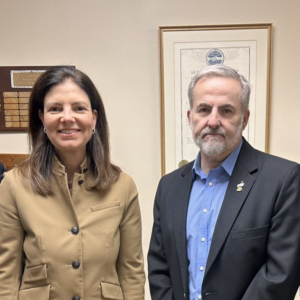When New Hampshire SEA/SEIU President Rich Gulla endorsed Executive Councilor Cinde Warmington in the Democratic primary for governor, it was big news in Democratic circles.
But when Gulla announced his union’s endorsement of Kelly Ayotte in the GOP primary, it was big news for New Hampshire politics.
“The State Employees’ Association recognizes Kelly Ayotte’s qualifications, integrity, and commitment to public service. We believe that she will work tirelessly to advance the interests of all New Hampshire residents,” the union said in a statement.
Ayotte, who’s facing off with former state Senate President Chuck Morse in the GOP race for governor, was happy to have the support.
“From maintaining our roads and bridges to protecting the public to serving our most vulnerable, our state employees play a vital role in making New Hampshire a great place to live, work, and raise a family. I’m proud to have their support, and as governor, I look forward to working alongside our hardworking state employees every day to keep our state safe, prosperous, and free,” Ayotte said.
But behind this endorsement is a bigger trend that could impact races across the Granite State: working-class voters abandoning the Democratic Party for the GOP, as affluent suburbanites are turning to the Democratic Party.
It’s not hard to spot the trend. In 2020, Joe Biden easily defeated President Donald Trump in New Hampshire by about eight points, thanks in part to winning longtime GOP strongholds like Bedford, with its suburban, white-collar electorate. At the same time, Trump battled Biden to a virtual tie among traditionally working-class electorates in Democratic enclaves like Claremont and Rochester.
Or take a look at the latest UNH Survey Center poll. Trump enjoys a massive lead over Biden among voters without a college degree, while Biden is winning nearly two-to-one among college grads. A generation ago, affluent college graduates were a pillar of the Granite State GOP coalition.
Not anymore.
The good news about the trend for Democrats is that people with four-year college degrees (or more) make up a larger percent of the population in New Hampshire than nearly any other state. The bad news: It’s still just 41 percent of people 25 or older, leaving a solid majority of the potential vote in the hands of people who aren’t four-year college grads.
And nationally, the trend is getting worse for Democrats. A new Reuters/Ipsos poll found just 32 percent of non-college-educated registered voters support President Biden, 10 points lower than his 42 percent support at this same time in 2020.
Dave Wasserman at Cook Political Report says the polls show “a tale of two electorates,” with Biden leading among “the most reliable voters”—older voters and college grads—whom Republicans have long relied on. But Biden “trails Trump 41-51 percent among the low/mid-engagement voters” in the swing states. Those voters tend to be blue-collar and working-class.
So, it’s no surprise that the SEIU, with about 11,000 state, county, municipal, and retired workers, is expanding its outreach to the New Hampshire GOP.
“It started six years ago when we formed a conservative committee, and it has really taken off,” Gulla told NHJournal. “More members have gotten involved. About a third of our membership is Republican.”
Asked if he sees a surge in interest in the GOP among the blue-collar members of his union, Gulla says it isn’t quite that simple.
“Sure, some of our members who support Trump are [highway workers] at the DOT, but we’re seeing interest across the board. I think it’s more of a reflection that New Hampshire is a purple state,” Gulla said.
Still, the overall trend is hard to ignore. More working-class voters are open to supporting Republican candidates. And the traditional “Republicans are management, Democrats are labor” divide is fading.
“I don’t know when the demonization happened between the Republican Party and labor, but I’m not sensing as much of it now,” Gulla said.
Asked about her SEIU endorsement, Ayotte told NHJournal, “Our message of keeping New Hampshire safe, prosperous and free is resonating with voters because they want to protect our way of life in our great state.
“No one wants craziness; they want results. Granite Staters know that I’ll protect our New Hampshire advantage, keep our communities safe, and defend our live free or die way of life.”
Veteran New Hampshire GOP strategist Michael Dennehy says it’s smart for the SEIU to reach out to Republican candidates.
“It’s smart anytime they can show they’re in the midst of the changing demographics of the state’s politics. We have seen a tremendous shift among blue-collar workers toward the GOP, and they’ve been a growing part of the party’s base over the past several years.”
Like most national political observers, Dennehy says Trump has played a significant role in that shift.
“Trump has shown he is a major influence in Republican primaries, though he could pose a problem in a general election.”
While many Granite State Republicans believe the SEIU is all but certain to endorse the Democratic gubernatorial nominee in November’s general election, Gulla insists nothing is certain. And, he pointed out, the SEIU hosted a member event with GOP presidential candidate Chris Christie during the First in the Nation presidential primary earlier this year. It’s another sign the union is open to candidates from both sides of the aisle.
“I’m told by one of our longtime members that we hosted [Republican] Pat Buchanan back when he ran for president,” Gulla said. “Our members are basically ‘a third, a third, a third,’ like the rest of the state.”
“And we’re like the rest of the country. We’re sick and tired of the polarization.”





